Dermott Hayes's Blog: Postcard from a Pigeon, page 80
April 22, 2016
T & A, half full or half empty
Being of an age that has seen female parts in just about every shape, size, shaved, groomed, spiked and hirsute, I can’t say I’ve ever found a ‘favourite’, since I’m with Maria Muldaur and Southside Johnny on this, it ain’t the meat, it’s the motion.
Most men, it is widely claimed, fall into one of two categories on the subject, tits or ass, although given today’s multi-choice alternatives, I don’t think those simple choices are any longer relevant or applicable.
Personally, although I’ve always been an ‘ass’ man, I’ve never let it get in my way if the flesh is willing. Big women, small women, skinny, tall or ropey, it makes no difference if the lady can’t, er, dance.
Similarly , with female genitals, methinks today’s obsession with hair or no hair, cosmetic alterations and so are manifestations of a society uncomfortable, literally, in its own skin. One of the most erotic experiences I’ve ever had with a woman, was on a flight to Paris from Mauritius. And it was a conversation.
You might call me old fashioned and, even if I am, so what? If there is a mutual willingness and desire, there should be nothing that can get in the way of two people taking it to the limits of their collective imagination and beyond.
So, there was one lady, I remember with relish and also for the fact that she went against every apparent trait needed to compose my favourite woman, she was taller than me (5’8′) and about twice my weight (70kg or 154lbs) but she was funny, intelligent and so on, for a bit of fun. We met at a party and she took hold of my tie (yes, I was in a suit and tie) and she asked me, ‘who taught you how to tie a knot?’ and I said, defensively, ‘I don’t know. I taught myself.’ And she said, well, drawled, really, looking deep into my eyes so I couldn’t move, I was transfixed, ‘weeellll, you’re doing it wrrroong.’ and she was pulling me, by the tie, to the bathroom and I shuffled, awkwardly, captivated, foot by foot and stuttered, ‘it’s a Windsor knot.’ Then she let me go and pushed me back against the bathroom door while she sat on the edge of the bath and looking at me with a smoky, heavy lidded look, she whispered, ‘a real Windsor needs a double cunt.’ But I’d stopped listening and my tie was on the floor, as she raised her dress and I could see her stockings and she wore no underwear but her hand led my eyes to her physical illustration of this sartorial composition.
But I’d stopped listening and my tie was on the floor, as she raised her dress and I could see her stockings and she wore no underwear but her hand led my eyes to her physical illustration of this sartorial composition.


April 21, 2016
Last encounter with the purple enigma
Prince is dead, long live purple?  yes, that’s me, with the hat, chasing down the purple enigma, we jeeringly called ‘Thimble’, in the way Dubliners do, because he was a small statured, self styled symbol of , what he said, was rock and roll exploitation. Funnily, or in a grotesquely ironic, pre-emption of his death, the Irish Times chose to publish an article by Jim Carroll that questioned Rock and Roll Hall of Fame inductee, Steve Miller’s assessment of that same industry as a bunch of thieves, etc. But, I wonder, if Prince might’ve praised him.
yes, that’s me, with the hat, chasing down the purple enigma, we jeeringly called ‘Thimble’, in the way Dubliners do, because he was a small statured, self styled symbol of , what he said, was rock and roll exploitation. Funnily, or in a grotesquely ironic, pre-emption of his death, the Irish Times chose to publish an article by Jim Carroll that questioned Rock and Roll Hall of Fame inductee, Steve Miller’s assessment of that same industry as a bunch of thieves, etc. But, I wonder, if Prince might’ve praised him.
Back then, as a social diarist, I was charged with the notion of keeping an eye on the elusive prince of darkness as, like a nocturnal moth, he sought the brightest lights in the city, where he could lurk, in the shade.
He was on a hiding to nothing with his record company, who took every cent from his live shows to make up the creative deficit from his refusal to make music for the rate he’d be paid. So he called himself, for all intents and purposes, Symbol, which, in Dublin parlance, became Thimble and then set about finding a venue where he night stage a gig where he could raise cash money and walk away proud and enumerated.
The unfortunate thing for him and John Reynolds, owner of the Pod and Chocolate Bar, was the pre-arranged deal with the Irish Hospice Foundation and their lavishly staged charity fashion show, complete with such catwalk names as Elle Mc Pherson, Naomi Campbell, Kate Moss and Cindy Crawford, among others, for an after show party venue and how it might be compromised by a pay (cash) per view deal with rogue rock star.
But where there’s money, there’s a way and the artist known as I’ll take what I caN GET, made the deal to let the models and their entourage through (they might look good in the video) and the show went on and what a fucking show it was. He played for three hours, odd, unrelenting, incredible, fuck you, rock and roll, blues, soul, soul funk, funk soul and funk you. It was brilliant.
So Prince, the weird, the odd, the thimble but, above all, the musician, I salute you and, incidentally, the most incredible cover of `Nothing Compares 2U has to be by the late Jimmy Scott.


Round Trip
‘Is that book any good? I love him. I read his last book. I didn’t know he had a new one out until I saw an ad in the station.’
She had smiling eyes, in a face worn and weathered. She lived a life of hardship, you imagined, but full of warmth and happiness too.
Her eyes were on me now, expectant, hesitant, waiting for an answer.
‘It’s a great book but very similar to his last one, a memoir of an elderly lady.’
‘I love a good book.’
She was beyond her middle years, but not elderly in the way people think of old ladies as slightly dotty, helpless, a little deaf and forgetful. Her hair was cut short to frame her round face and rosy cheeks. She wore the lines in her face with ease, comfortable landmarks of her life. She was sensibly dressed. Understated, with a blouse the colour of vanilla ice cream. She wore a simple gold chain with a tiny crucifix.
‘What are you reading?’ I asked.
She leaned back and took her hand from the cover of her book. I recognized the face of a famous sportsman.
‘You like biography?’ I asked.
‘I read all sorts of books but I’ve always been interested in reading about him.’
Her accent was north Dublin, I guessed, Glasnevin or Cabra.
‘He’s a tennis player?’
‘Agassi.’
‘Yes. Wasn’t he in a band with John McEnroe?’
‘No, that was the other fella, the Australian…’
‘Pat Cash. ’Mulleted, beefy, slightly rakish, I could never work out if he was a chuggin’ a tinny type or at one with his inner rock star.
‘Yeah. I love stories about people like him. He was a very unhappy man,’she said.
‘He married an actress?’
‘Brook Shields. But they’re divorced. He’s married to Steffi Graf now.’
‘You don’t strike me as the kind of person who’d enjoy someone else’s unhappiness.’
She looked at me with a squinty eye as though she were trying to see some point beyond my surface.
‘No, I mean there was a person with a great skill, massive success and loads of money, but he suffered depression and he raised millions to help underprivileged kids develop their talents.’
‘People always acquaint wealth with happiness.’
‘I know but it’s not just that. I mean he had a talent, like a gift. I’ve always envied people like that.’
‘What do you do?’ she asked. Again with the penetrating look, not threatening but intense enough to let you know she didn’t deal in surfaces.
Her question caught me off guard. What do I do?
‘I work in a bar.’
‘You work in a bar? A pub, like?’
I nodded. As a literal answer to the question she asked, it was the truth. But her question bit deeper and resounded. I suppose we all reach the age when we ask ourselves the same question. Some of us spend a lifetime trying to find and answer. What do I do? I’m a writer, a silent voice said inside.
‘Do you own it?’
She was measuring me now. When we reach these middle years we find little time for procrastination.
‘No,’ I said, smiling, ‘I just work there.’
‘D’you ever find, now you look like a young man to me but I can see you’ve been around, when you get to our age, you’ve less patience?’
‘How do you mean?’ Again with the pithy retort. Her change of subject kept me off balance. Is she reading my mind?
‘I was never very sure of myself, growing up. I left school when I was 16, but I always loved reading.
‘I still work,’ she continued after a short pause when she picked up her book and gave Agassi’s face the once over. ‘My husband’s retired and my children are all grown up, except for the one, Sean, who’s 30, but he’s cystic fibrosis and in a wheelchair all his life…’
I say what I think now, that’s what I mean.’
‘Sebastian Barry’s from Wicklow. It seemed an apt time to read his new book,’ I replied. Subtle as all Hell, eh?
‘I saw an ad for it in the station. I read his last book, ‘Sacred Scriptures.’
‘This one’s very similar in so much as it’s a memoir of an elderly lady although this one’s set in America.’ I said that before. Maybe not the America bit.
‘There’s more to you than you let on…reading Sebastian Barry and the things you say.’
‘Do you mean a barman can’t read books and have a good conversation?’
‘No, I didn’t mean that at all. It’s just…’
Pausing again, her attention shifting to movement on the train as an elderly man lowered his self into the window seat opposite. She smiled. He smiled.
‘Is it my imagination or are they making the seats narrower on the trains these days?’ he asked.
‘We’re like sardines,’ she replied, shifting in her own seat.
He smiled as he settled. He was a tall man and slightly stooped. His movements suggested the wear and tear of age, arthritic joints. He was bald with well trimmed gray hair at the sides; piercing blue eyes, creased with smiling lines and a warm intelligence. He had an air of confidence about him.
‘Have you just got on?’ she asked.
‘No, I was standing at the end of the carriage when I spotted the opening.’
‘Don’t you wonder why there’s only three carriages on this train that’s full and there’ll be six empty carriages, two passengers and a dog on the last DART out of Howth?’ I asked. Could I be more inane?
Again with the smile. I felt like a fool.
‘I got the train to Dublin yesterday to see the match. It was the same thing. I stood all the way.’
‘I was on a LUAS the other day,’ she offered, ‘and for the first time in my life somebody got up to give me a seat. I took it too and I was glad of it’.
We all smiled as we considered this. She had a way of drawing conversation from her own observations.
She continued, ‘Manners have always fascinated me, and class.’
‘Do you mean ‘class’ as in ‘social standing’, so to speak, or personal style and élan?’ Did I just say ‘elan’? Oh my God.
It was her turn to smile, a smile of friendly indulgence.
‘My family never had any money, but we were brought up to have good manners. And I’ve reached that age where I didn’t mind taking the seat offered to me. I was kinda chuffed, in fact.’
‘Good manners are a scarce commodity,’ Friendly Eyes offered. I felt resentful of his contribution and angry with myself for that feeling. Who stole your rattler? I thought. I felt we were being patronized. I thought I was being a dickhead.
‘You asked me about class… Well, I started working for a doctor in his private practice when I was 16, and I still work for him. He’s a very wealthy man and they have a beautiful house with a library of books, and I’ve always loved those books. His family is lovely people and they always treated me well, and even encouraged me to read whatever books I wanted. But this is what I found; they were used to money and wealth, so class and manners are natural to them, the snobs were the ones who married money.’
‘Two things rule the lives of the middle classes: fear and aspiration.’ Oh God, I want to jump off the train. Are we close to a trestle bridge over a gaping chasm?
‘Y’see, that’s why I think there’s more to you than you let on.’
A benign grin from Friendly Eyes before he rose to make his way to the toilet made me squirm. Is this woman a saint?
‘Andre Agassi was a very unhappy man because I don’t think his talent was of his own choosing.’
‘A talent is not a passport to happiness.’ Mr Cliché, I presume?
‘No, it’s not. Look at Van Gogh. I went to see the Van Gogh gallery in Amsterdam last year. There was a man with a God given talent but he was never happy.’
‘Have you traveled much?’
‘I never traveled in my life until my brother died three years ago. He lived in England all his life and I got my first passport before I went to his funeral. I always say it was his gift to me, the passport.’
I fought the Tourettish impulse to say you don’t need a passport to travel to England. I won. Tact is my middle name.
‘I’ve been to Paris and Amsterdam and I’m going to Rome this year. I’ll go to all the galleries. When I saw Van Gogh’s early work, there were pictures of people out in the fields and you could smell the earth.’
She gazed out the window at the blurred countryside whizzing by. Her eyes focused on a far off place. Her eyes shone, her face glowed.
‘There was a picture of a sandy beach. It was like being on Portmarnock strand. I never knew you could feel so many emotions looking at a picture.’
She turned and looked at me as though I’d walked in on some private reverie. She smiled. Blue Eyes returned. He pointed at her book.
‘Are you fond of your sports?’ he asked.
‘Not really.’
‘He was one of the greatest natural champions, they say’.
‘Was he? He was a natural, alright but his father put a tennis racket in his hand when he was two and drove him hard all his life.’
‘His first wife, Brook Shields had a very pushy mother,’ I piped.
‘The ambitions of the parents often destroy or smother the talent of the youngster,’ Blue Eyes said. He was quiet after this and took a long look into the same half distance where she saw Van Gogh.
I wondered how a random conversation on a train had turned to discuss the very topic of a short story written that morning. We spend our lives trying to find an identity and a role for ourselves , but a chance encounter on a train reminds us life is a round trip, if we’re lucky. That has won me the Blue Peter Badge for Insight, at least.
Lillian introduced herself while Friendly Eyes was using the facilities. ‘Lillian’, I thought, wondering if she’d ever read Lillian Hellman, the activist playwright. On any other day on a train I’d have my earphones on and my nose stuck in a book to avoid the inanities exchanged by anonymous strangers. Friendly’s moves were exploratory gambits; public transport, sport, books, but Lillian, I suspect, has no truck for the safe road.
‘You said there are two things drive the middle classes, fear and, what was it? Aspiration, was it?…That’s a posh way of saying ambition, isn’t it?’
It was like a three card trick, she could pull an ace out of anywhere. I was nailed, but in a gentle way.
‘Yes, you’re right,’ I acknowledged, ‘but the two go together. I mean , it’s fear that drives their ambition.’
‘And there’s a lot of that about today,’ Friendly Eyes piped. Lillian and I looked at him. There was a beat of silence.
‘Ambition or fear?’ asked Lillian.
‘Fear, I’d’ve thought,’ said Friendly Eyes.
‘The Collapse of Capitalism, Recession, Negative Equity, Debt…there’s not much room for ambition anymore,’ I said, thinking, am I speaking with capital letters?
I could see Friendly was in more comfortable territory. Lillian was chewing on the thought.
‘ I never believed in borrowing or owing anything.’
‘But now we’re paying off in taxes the debts of those who did,’ I added. A popular bugbear, safe ground. I wanted to quote the advice of Polonius to his son, Laertes in Hamlet,
“ Neither a borrower nor a lender be,
For loan oft loses both itself and friend,
And borrowing dulls the edge of husbandry.”
I smothered the urge. Such restraint.
‘I am in the process of retiring,’ Friendly Eyes offered. ‘I have my own business but now I’m passing it on.’
‘To someone in your family?’ I asked.
‘No, I’ve sold the business and I’m glad to get out of it now when after thirty years of success, a bank manager might refuse you finance.’ He was silent. We waited.
‘It was only a small business but I employed 30 people and I’m responsible for their livelihoods and income. It’s a huge burden to carry.’
‘My son’s lost his Christmas care bonus because of the cutbacks,’ Lillian said. ‘My own carer’s allowance was reduced.’
I was on my way to visit my daughter and my new grandson. What does the future hold for them?
My stop approached. I shook hands with Friendly Eyes and we told each other how much pleasure we got from this chance encounter. Lillian took my hand and squeezed it. I wanted her phone number, her email address, I wanted to eat chocolate éclairs and almond rings in Bewley’s with her while she told me of her latest literary discoveries and described adventures in foreign galleries. I knew I wouldn’t ask.


April 20, 2016
Hypo, no typo
‘he woke in the dark, smelly confines of a car boot with a splitting headache and the realization that holding onto a coherent thought had become as tricky as picking up raindrops from a petal.’
Hypoglycemia occurs when your blood sugar gets too low. For a diabetic, it’s called diabetic shock and it’s no joke, if you’ve ever experienced it. As someone with hemochromatosis that has caused diabetes, I’ve been in that battle ground on several occasions. Two years ago, I published a crime novel, Tito’s Dead. One of the characters is a diabetic journalist who gets kidnapped by a gangster anxious to elicit some information from him. The character’s name is Garvan Deare and this is his experience.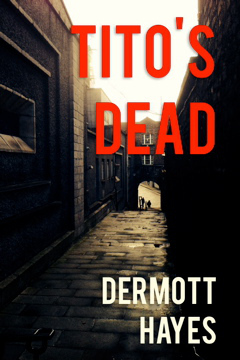
Heels pulled into the wire and concrete fenced yard of the disused dockland warehouse, flush with confidence. As he swung the sleek Mercedes into a corner parking spot, he ran through his triumphant arrival in his mind’s eye.
He’d give it loads of ‘it’s-all-in-a-night’s-work, boss’ as he dropped his human booty at the feet of Joe Connolly. He couldn’t suppress the strut as he sprang from…
View original post 1,154 more words


April 19, 2016
The Contest
How many pips are there on the r-r-r-radio before the news?”
The walls wept with sweat and tension. Each team of five stood together in a row for most of the contest but in the tie breaker round the two nominees were appointed front of stage, each to the left or right. They were not allowed to confer with their teammates and the judges’ decision was final.
The quiz master was a local schoolteacher. He sat uncomfortably to the left of the stage in an ill fitting, chalk dusted brown suit. Miss Henchy, keeper of the parish hall and the flowers on the altar, sat beside him on a short, wooden bench. She was keeping score and time. They both leaned on a small table facing the two teams.
Barry Murphy was the hope of the visitors but this wasn’t his question to answer. A lanky boy, two years his senior, was the nominee for the other team. Beads of sweat covered his upper lip. Barry felt his own tongue swell as he faced this hostile village, agog with silence in the smoky hall. Even the coughers and hackers were silent for this penultimate moment.
The seconds ticked away like the PIP…PIP…PIP…PIP…PIP…PIP popping in his head, it’s eight o’clock and here is the news, read by…’
‘Six,’ Murphy shouted just as time ran out for his opposite number and Miss Henchy poised to pass the question over.
A nanosecond of suspenseful silence followed.
‘C-c-c-correct,’ said the quiz master.
The hall erupted. There were whoops and cheers from Murphy’s side, a boast of parents, priests, teachers, GAA officials and some classmates. These were met with howls of derision and protest from the home side.
-‘Foul.’
-‘He answered too soon, it should be disallowed.’
-‘He interrupted.’
They crowded and jostled the quizmaster who retreated to a corner to confer with the cassocked parish priest. Miss Henchy stood sentinel between the huddled pair and baying mob. A teacher from the visiting school joined the huddle.
The lanky boy from the opposite team cried, inconsolable and indifferent to the ministrations of his teammates. The crowd jostled and argued but stayed clear of the judges’ huddle in deference to Ms Henchy and her sharp tongue.
‘This is no faction fight,’ she said, ‘so hold yir tempers and yir tongues ‘til we hear the judges.’
The annual Muintir na Tire (Country People) primary school quiz contest had become a battle ground for local honour in parish politics after the school team was narrowly beaten in a hotly contested semi-final against a neighbouring village the previous year.
This year’s team was tipped to go the distance after dispatching the previous year’s champions in the first round. Young Barry Murphy, although the youngest in the team, was their ace in the hole and the only survivor from the team defeated in last year’s semi-final.
Barry watched the boy from the other team. He appeared to have shrunk and capsized within himself. He remembered him from former contests, quick witted and cheerful, friendly, too. He felt he’d let the air out of his tires.
No-one took any notice, all eyes were on the huddle of judges. The room buzzed like a disturbed hive of angry wasps. The contestants were ushered off the stage to a room behind the hall where soft drinks and tea were laid on and sandwiches with thin slices of ham, egg and onion and slivers of cheddar. No-one ate or drank. They could see the stage through the open door.
Nothing was left to chance this year. The team had its own coach, the secretary of the local GAA club and an active member of the parent/teachers committee. He attended other quiz heats and compiled a list of questions. He bought books on general knowledge quizzes, a bunch of encyclopaedia and encouraged the team members to watch a schedule of tv quiz shows.
“Keep your eyes open and your wits sharp,” he said, “the questions will always be drawn from things you are likely to know, from things that are going on all around you, whether it’s history, geography, current affairs, films or music, …it’s all there in front of you if you’re prepared to look for it and find it!”
When the quizmaster asked the tiebreak question Murphy experienced a moment of subconscious clarity. He stood there front stage, staring into the stinking mist, his mind, encased in a light of sublime calm, began to recount the pips…’Pip..Pip..Pip..Pip..Pip..Pip’ and the familiar Radio Eireann announcer’s voice said, It’s eight o’clock, this is Radio Eireann, here is the news read by….’
“Six,” he shouted as the soft yellow light burst like a bubble round his head and the noise and tumult, caused by his premature response, blasted him back to reality.
‘Woooohooooo,’ the crowd roared as the quizmaster took to the stage. They pressed closer. Divested of his jacket, tie loosened, stains of sweat darkening his cuff worn shirt. In his agitation he dropped the crumpled sheet of paper in his hand and bent to retrieve it.
‘Go on, Pat,’ a voice shouted, ‘we’ll carry the day.’ Ms Henchy joined him on the stage and cast a cold eye to silence the room.
“AAAaaaaah,” the quizmaster began, “first, I’d like you all to show your appreciation of our v-v-v-visitors and their part in tonight’s s-s-s-s-porting and e-e-e-xc-c-c-iting contest…”
Barry Murphy felt sick. He felt his gorge rise in a wave of bilious nausea and stumbled to the toilet.
Onstage, the quizmaster was met with silence until the parish priest rose from his seat to clap loudly. The crowd growled.
Holding his hands aloft to silence them, the priest said, in support of the quizmaster, “this has been a great night of entertainment and we mustn’t shame ourselves in the face of our guests. There are some here tonight,” he added, sweeping the room, “who might do well to show as much enthusiasm for prayer as they do for contention and barracking.”
Then having spoken his piece he sat down indicating with a silent nod for the quizmaster to continue.
In the bathroom cubicle, Murphy felt the acidic rush burn his throat. His body heaved and shuddered.
‘Are you alright?’
He spat, tore a strip of toilet paper from the roll and wiped the sweat and spit from his face.
‘I’m fine,’ he said, standing up and turning. The lanky boy from the other team stood there, a look of concern in his hangdog face.
‘I’m Barry.’
‘I know. I’m Jimmy.’
They stared at each other for what felt like a ten minute conversation but was over in a second. They shook hands.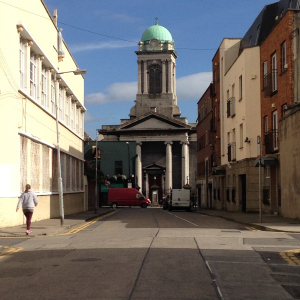
Outside the quizmaster retrieved his sheet and composure, wiped his brow, settled a stray lank lock in his comb-over, straightened his tie and cleared his throat, “thank you, f –f- father and I’d also l-l-l-like to extend a w-w-w- warm and f-f-f-f-friendly greeting to F-f-f-Father Greely of our neighbouring parish as well as the teachers, parents and su-su-supporters of the other team.” Desultory applause followed until the parish priest stirred and swivelled in his seat. The volume of applause rose.
” ‘Twas a t-t-t-t-ightly fought contest, we’d all agree,” the questioner began again, “but in the end there can only be one w-w-w-winner.”
“They’re still tied,” came a disgruntled voice from the crowd. “They should be disqualified for cheating,” came another. At which point the parish priest shot from his seat and vaulted with one hand onto the stage and surveyed the room, redolent with body odours, tobacco smoke and fearful silence.
“Both teams deserve a w-w-warm r-r-round of applause,” the quizmaster, emboldened, continued .
“Get on with it.”
Even the parish priest was losing patience.
“Having answered the tie break question s-s-s-s-uccessfully,” he went on, but his voice was drowned by the uproar that followed, ” the v-v-v-isitors are the v-v-v-victors.”
There was no time to celebrate or commiserate with the vanquished before the visitors were whisked from the hall by a back door into the convoy of waiting cars. Supporters jostled with the angry home team crowd as they scrambled into the cars. One girl scraped her shin against a car’s door in her haste and cried out with pain.
Horns blared as they left the village in their wake. The convoy of cars lit up the night sky like a colourful streamer in a parade.


April 17, 2016
Etiquette, manners and profit
How many times, in a busy working day, do you wish footpaths had traffic lanes, that there were slow lanes for tourists and day trippers and right and left lanes for oncoming pedestrians?
Your thoughts are on your purpose, its important and essential nature and you seethe at the apparent disregard of others.
I remember a time when people left their front door keys in the lock, milk was left in glass bottles on your doorstep and church doors weren’t padlocked.
Nowadays, it is common practice to ‘demand’, without ‘asking’ and some people will even click their fingers or whistle to get attention.
When did we lose respect for ourselves and each other? Why do we get angry at beggars for begging? Most of the time, they are unfortunates who have fallen through the cracks through illness or by their own misdeeds, so what harm or injury can they do us?
We had a little book of etiquette, we studied in school. It showed us how to behave, socially; which fork or spoon to use at the dinner table and how to address people of importance and standing.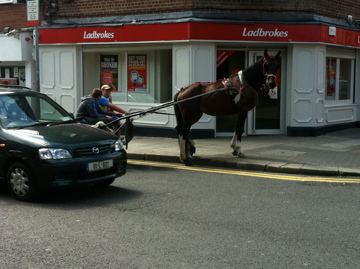
It didn’t teach us respect. We learned that from our parents and other figures of authority in our lives.
So what went wrong? The answer could be very difficult and complex. It could also be very simple. Greed and the all prevailing imperative of profit is what has brought us to this sorry state.
When we’ve abdicated our respect for our own environment, the air we breathe, the land we farm, the waters we fish, then we’ve lost respect for ourselves.
Take a bit of time, soon. Go to a farmers’ market with no preconceived notions of hippies in wellies chewing rubbery tofu. Everyone talks to each other. They remember you. They discuss the quality of their radishes. It will give you hope.


Hat’s Entertainment
Does anyone know about men’s hats, anymore? Back in the day, buying a hat was easy.
I started wearing my hat, a grey, snap brim trilby, in 1995. I remember the day and the circumstances. The editor of the Evening Herald called and confirmed my appointment as the paper’s diarist, writing a daily column about the city and its denizens and what they got up to of an evening. He asked me to report for duty that day and have my photograph taken for the column’s masthead.
Since I’d already spent the previous two weeks writing the column under a self styled pseudonym, ‘John Newman’, I was familiar with Independent House on Abbey St so when I got there, I went straight up to the photographers’ studio at the top of the building. The snapper on duty told me it would only take a minute and he went about fiddling with the lighting and setting up the profile shot. Then I got a flash.
I had just finished reading and reviewing Neal Gabler’s ‘Walter Winchell: Gossip, Power and the Culture of Celebrity’, a biography of an American journalist who, it is widely claimed, was the first gossip columnist. Sweet Smell of Success, an American noir classic starring Burt Lancaster and Tony Curtis and which was loosely based on Winchell, had long been safely ensconced in my Top Ten List of favourite movies.
‘Can you wait five minutes?’ I asked the snapper, ‘there’s something I need to do.’ Before he answered I was out the door and descending the stairs, two at a time. I ran out the front door and turned left, heading for O’Connell St. I ran across the road and straight in to Clery’s department store. Back then, the store had a proper hat department with old men in neat suits and measuring tapes. Quickly scanning the rows and rows of hats in different colours sizes and shapes, my eyes found the hat I wanted. I asked the attendant if I could try one on and he said,’fire ahead’ and pointed me to a mirror.
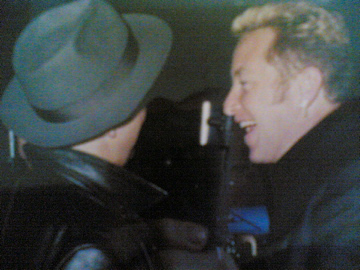
chatting with Michael Flatley in Lillie’s Bordello
The first hat I tried was too small, the second one, a perfect fit. The attendant stood beside me, attentively. But he took the hat from me and, with a deft and practiced twitch of his wrist, snapped the brim, explaining ‘this is a snap brim trilby.’ I looked at him in horror. ‘Have you another one the same size?’ I asked, explaining, ‘I don’t want the brim snapped.’ He sighed and found another hat, unsnapped, and gave it to me, a perfect fit. I paid him and left. In the studio in Independent House, I put on the hat and smiled, ‘you can take my picture now.’
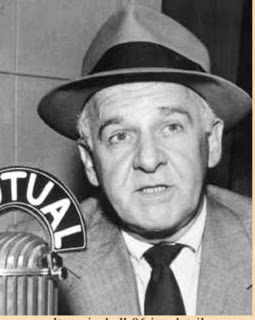
Walter Winchell
The hat achieved all I wanted it to do, and more. I realised, as a diarist, I needed an edge. Winchell worked at night, on the beat of nightclubs, restaurants, theatres and hotel lobbies. I wanted to do the same, to become the eyes and ears of the paper’s readers, so when they picked up their paper the next day, they would read an account of the city’s social nightlife less than twelve hours after it happened.
I didn’t wear my hat on the ‘Dublin’ side or the ‘Kildare’ side, as the hatters’ and practice believed or advised. I wore it back on my head, unsnapped. I broke the rules but for a purpose. I thought if I wore it too slouched, it might cover my face and give me a sinister or hidden appearance. Wearing it back and unsnapped, left my face open and myself, approachable. It also gave me an identity. People ‘knew’ who I was when I attended an event and that made it easier for me to approach them. As a journalist, I felt a reluctance to relinquish my anonymity but in the nature of the job I was taking on, it was a necessary sacrifice. My hat got me in doors and that’s where the stories were.
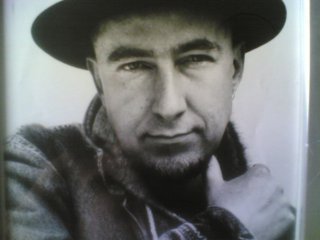
It had its ups and downs, of course. As the paper played up my name for finding ‘scoops’, they played up the association and once advertised three exclusives in the Dairy as ‘a hat trick’. Eventually, they changed the name of the diary to ‘The Hat.’ Me and ‘The Hat’ were synonymous.
There’s a strange thing about hats and public perception of them. Forty years ago and more, almost everyone wore a hat. It was part of your wardrobe, as much as a pair of socks. Then people stopped wearing them. My hat was an exception and for some odd reason, people felt the urge to grab it, steal it, wear it. They never asked and it led me to believe it was an enormous discourtesy, simply bad manners. Yet confronted with their social aberration, one was greeted with blind, incomprehension, as though I was speaking unintelligible gibberish.
On the other hand, as I’ve said, it got me noticed and it got me in doors. At the black tie opening night of Riverdance in Radio City Music Hall, New York, a leading Irish socialite approached me and introduced me her own gathering of close friends who included the CEO of one of the world’s best known insurance companies and the president of a leading international bank. It was a case of mistaken identity. My first clue was how she introduced all her companions to me, indicating I was so famous I didn’t require introduction. This was confirmed at the interval when the bank president approached me with his programme in hand and asked me to autograph it for his granddaughter who, he said, was a big fan of my music. I signed it, ‘Close to The Edge.’
Another time while I attended the launch of a book about then World F1 champion, Damon Hill in London’s impressive Natural History Museum, I was approached by a slouched, grey haired man, wearing a hat and accompanied by three children, I gathered were his grandchildren. ‘Excuse me,’ he said, ‘are you The Edge from U2?’ ‘No, I’m not,’ I told him, adding, ‘but right now, I wish I was, Mr Harrison.’
At the gala, star studded opening of Planet Hollywood on St Stephen’s Green, the celebrities were coralled in the Conrad Hilton on Earlsfort Terrace before they were transported by waiting limos to the red carpet which began outside the College of Surgeons. Pat Kenny stood on a flat bed truck outside the floodlit entrance of the restaurant and announced the celebrities as they arrived to take the walk down the carpet, cheered by the celebrity spotting public, lining the way. In the Conrad, I was approached by Arnold Schwarzenegger who shook my hand and, leaning close, said, ‘I love your hat.’
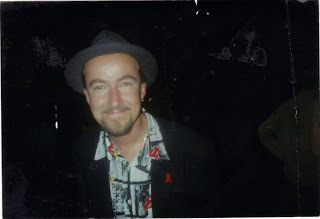
Riverdance world premiere, Dublin, mistaken for The Edge, again
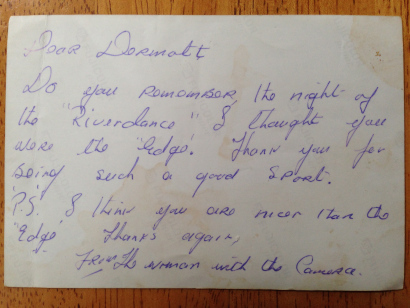
I shared a limo to the event with singer Michael Ball and his manager. When we emerged from the car, there was a very brief silence before Pat Kenny announced Michael’s presence but in that second a local wag could be overheard asking, ‘who’s dat with The Hat?’, prompting Michael to joke it would be the last time he’d give me a lift in Dublin.
The hat could be a nuisance, too and I took to not wearing it when I was on holidays or out with my young, growing family. It could be an unwelcome and frankly, ironic, intrusion.
These days, there’s a revival of hats even if everyone opts for that ‘porkpie’ ‘wideboy’ look so loved by Hollywood’s young and trendy arrivistes. But in Dublin, the real hatters have gone and hats are sold like party treats without any notion of their fashion culture. After buying my first hat in Clery’s, someone introduced me to Mr Coyle’s shop on Aungier St.
It was an old school men’s haberdashery where
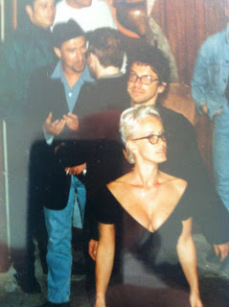
On the town as The Hat, chatting to Bono with Michael Hutchence and Paula Yates, foreground
string vests and studded collars could be bought alongside a staggering collection of hats of every shape, size and style. It was a mecca of hats.
Mr Coyle supplied all the hats for Neil Jordan’s Micheal Collins film and delighted in explaining the subtle differences between a proper bowler and an ‘Anthony Eden.’ Head to Toe, the RTE fashion show, once approached me to talk about hats and I insisted the interview was done in Mr Coyle’s shop. He was delighted. Unfortunately, he was an elderly gentleman and when he died, a great tradition in Dublin died with him.


April 16, 2016
Walking is painful
Every step I take, every move I make is extremely painful. It wasn’t always thus. In fact, I’ve always been very active, played sports as a kid right up to college and, for a while, after, too. I love cycling and it’s never bothered me to take long walks.
Where most people will drive, I don’t even own a car. Now, living in the centre of a lively city, means I don’t need a car to get around. There’s public transport, Dublin city bikes that let you hire a bike and jump on and off. And there’s always my favourite, Shank’s Mare.
I had a job once as a tour guide in west Clare’s Burren region, a remote, rocky, limestone landscape, memorably described by Cromwellian parliamentarian, Edmund Ludlow in 1652 as ‘ a country where there is not enough water to drown a man, wood enough to hang one, nor earth enough to bury him.’ On those long, summer evenings I would hire a bicycle from a garage in Lisdoonvarna and head off, over the hills, into the remote hinterland, to find the highest spot from which to watch the Atlantic sunset.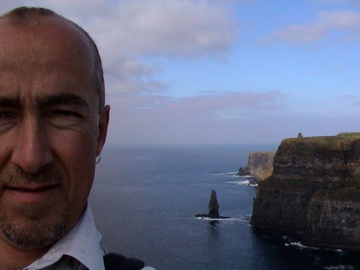
Wherever I’ve gone on holiday, a long walk, on a beach, across a bog, over a mountain or through the streets of whatever town I was in, was a priority. There is no other way to discover a place than on foot and getting lost is often the best part of the adventure.
When I was a teenager in Dublin I prided myself on being able to walk from one side of the city centre to the other, only travelling in laneways and alleys. Since then, that fascination with alleys has remained. You know the kind of dimly lit and dank pathways that usually feature in movies with a soundtrack of dark, ominous foreboding? And everyone’s thinking, ‘don’t go down there.’ Yup, I was that fool.
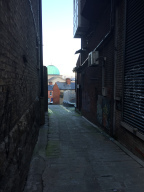
There’s something about the dim light, the smells and the detritus of an alleyway that draws me in. Oh c’mon, who wouldn’t take stroll down Diagon Alley, if they had a chance? There’s magic in the air and history, the reek of past ages, cutthroats and cutpurses, perfumed doxies, hustlers, pimps and drunken dandies.
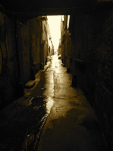
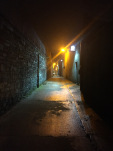
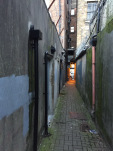
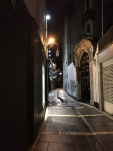
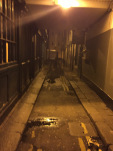
Alas, now, walking is painful because ankle arthritis has put a peg in my dander, so to speak. Going out and taking a walk, even to the local shop, is a task that requires careful planning and all the attendant pain. But just like Newton’s third law, for every action there’s an equal and opposite reaction and I wouldn’t swap the pain for all the walking pleasure I’ve had or the memories that go with them.


turtle
April 14, 2016
Eating Oysters
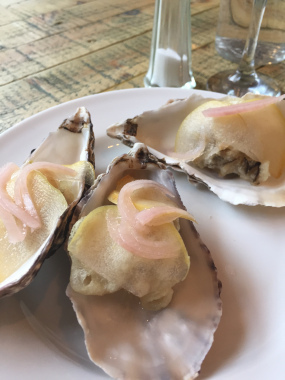 The oyster trembled in its shell as Trevor held it shakily at arm’s length. This was it, he thought, for Queen and Country.
The oyster trembled in its shell as Trevor held it shakily at arm’s length. This was it, he thought, for Queen and Country.
But still he hesitated. He cursed the day his editor decided it was a good time for him to take a trip south of the border. ‘To see how the others play,’ his boss had said, laughing as he tossed the embossed invite across his desk.
He cursed the so-called ‘peace agreement’ and the ‘Good Friday accord’ and everything else that had conspired to bring him to this point, standing on the banks of the Corrib beside a marquee tent with a fresh pint of Guinness in one hand and a slimy bicuspid in the other.
‘How’d’ye eat these things? I’ve never had one of them in me life…what d’ye do wi’them?’
His voice sounded like a bunch of empty tin cans rattling around in a barrel. I tried to hide my grimace from the hapless Trevor. We were already tucking in to our fourth tray of oysters that afternoon.
The day began when we followed the parade of Oyster shuckers in their national dress from Eyre Square as they followed the pipe band led by the Lord Mayor to the World Oyster Opening Championships, diverting along the way to amble, sociably, through some of the pubs on the festival pub trail. One pint of creamy headed Guinness earned you a tray of half a dozen Galway oysters. There was no sign of Trevor, the whiny voiced northerner we met in the hotel the previous night.
Trevor told us he’d never been south of the border, that he was a journalist with ‘a wee community paper’ in Belfast and that he drew the short straw and was sent to Galway. He made it sound like an assignment to the front line in a foreign conflict.
‘It’s this peace agreement, y’see,’ he confided, somewhere around his fifth free pint provided with gusto by the brewery man with the generous plastic, ‘my editor thought it might make a good angle to cover one of these free state festivals.’
As the night wore on Trevor’s apparent paranoia became more obvious. Particularly when the singing began. When we offered to sing ‘The Oul’ Orange Flute’ in his honour, he fled from the bar and wasn’t seen again until now.
‘Trevor,’ I said to him, ‘we missed you this morning on the pub crawl. There’s nothing like the hair of the festival dog that bit you to set you up for the day.’
Trevor did look the worse for wear. He was unsure of us because, though friendly and approachable, we might be pulling his leg. In the culture shock of his travels and the fuzzy stupor of an evening of free beer and a hangover that left him feeling someone had dropped a manhole cover on his head, he didn’t know whether up was down.
He dressed in a hurry and probably in the dark. The flies on his trousers were half undone and he missed a button on his shirt, leaving two opened buttons on top with only one buttonhole between them. Half the collar of his black blazer was tucked awkwardly into the collar of his shirt.
But that was less distressing than his physical appearance. His thin, sallow skinned face was drained of blood, darkening the hollows of his eyes even more.
But he was gamely waving the open shell about in the air, determined to perform the task he’d been set. He had to eat an oyster.
‘Put it to your lips, close your eyes, tilt your head back and swallow,’ we advised.
‘What does it taste like?,’ squinting Trevor asked, the oyster still at arm’s length as though it might spring from its half shell with a murderous rebel yell.
‘Don’t chew it,’ I offered, ‘you won’t taste it the first time. Just let it slide down…’
‘Like snot from a walrus,’ my friend offered, unhelpfully.
‘Don’t mind him…lash it into you,’ I exhorted.
Trevor closed his eyes and tilted his head back as he opened his lips and the succulent bicuspid slid down his throat. His previously ashen face turned a glowing puce pink.
‘’Swallow,’ I said.
We could see Trevor shrink before us. His Adam’s apple chugged impulsively. And as the oyster slid down his throat his face drained to grey then a pale, unhealthy, greenish pallor.
We stared at him in bemused alarm.
‘Are you alright?’ I asked. It was clear something would give. Trevor’s volcanic hiccups were about to erupt.
Convulsing, the colour rushed back to Trevor’s face as quick as it had left him but in reverse order of green, grey and then puce. My friend, recognising the signs, lifted his pint out of harm’s way as a feed of Guinness from the night before made its way from the shaking Trevor in a projectile green arc with the oyster leading the parade.
Nonchalantly side stepping the bilious shower, we exchanged glances. A smile hovered around the corner of my friend’s mouth, ‘Oyster says No!’ he declared.


Postcard from a Pigeon
- Dermott Hayes's profile
- 4 followers







